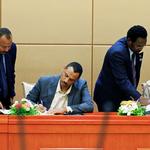Sudan’s popular uprising and the demise of Islamism
How to cite this publication:
Munzoul A. M. Assal (2019). Sudan’s popular uprising and the demise of Islamism. Bergen: Chr. Michelsen Institute (CMI Brief 2019:3)
This Sudan Brief is concerned with the fractionalization of Islamism during Bashir’s rule (1989-2019). It does not focus on the details of Bashir’s brutal rule, rather, it is about the emerging disunity from within which eventually led to the removal of Bashir from power. I analyze factors that led to the Islamists adopting a more pragmatic stand, especially after the main ideologue of the Islamist movement was kicked out into the cold in 1999. The Brief argues that although the Islamists have successfully created a parallel or deep state the last three decades, the political shift of power away from the Islamists which the 2018 popular uprising represent, makes the political future of Islamism bleak.
Loss of social sympathy
In December 2018, a peaceful popular uprising erupted in Sudan which led to the downfall of Omar al-Bashir in April 2019. The thirty-year authoritarian rule by the Islamist National Congress Party (NCP) thereby came to an end. Last month, a new law officially dissolved the NCP which was a key demand of the popular protest moment.
The recent protests were fore fronted by young women and men who were born and raised during Islamist authoritarianism. This was in and of itself seen as a crushing defeat of the Islamists’ ideological project and thus represent a bleak future for political Islam in Sudan.
While Islamists still are active in the military, the security and the civil service, their political future and chances to ascend to power again are meager.
They have lost social sympathy and because of this the opening for creating or renewing their alliance with the military is shrinking. Although Sudanese Muslims are conservative and the revolution is not likely to change that, the deteriorating political, cultural and economic impacts on ordinary people’s lives that the Bashir regime has created has resulted in a fundamental mistrust in the ideological project from which corrupt political leaders get legitimacy. This was manifested in the fact thatpeople started pulling down Imams who showed sympathy to the Islamists. While religion will continue to be an integral part of social life in Sudan, what people see as manipulation of Islam by politicians is not easy to pull off in post-revolutionary Sudan.
Bashir´s rise to power
President Bashir came to power in June 1989 through a military coup staged by the then political face of the Islamist movement, the National Islamic Front (NIF) which was later re-named the National Congress Party (NCP) in in 1998. Four years before the coup, the NIF came in third in the multiparty parliamentary elections that followed the ousting of President Jafaar Numeiri. Like Bashir, Numeiri was ousted by a popular uprising in April 6, 1985. The Islamists were among the key players in the downfall of Numeiri and were also part of the transitional government of 1985-86, where Dr. El-GizuliDaffalla was appointed Prime Minister. Dr. El-Gizuli Daffalla was the head of the Sudan Doctors’ Association and was an Islamist, although he disguised this from the public. The Islamists used the transitional period to consolidate in preparation for the elections. They were successful in doing so, coming third in the elections and forming part of the coalition government of Sadiq el-Mahdi. While the NIF used the transitional period to reinforce its position, the multiparty democracy provided them with yet another chance to build and further consolidate their alliance with the military.
Sudanese Islamism can be traced back to the Muslim Brotherhood. An offshoot of the Egyptian Muslim brotherhood and their presence in Sudan goes back to 1954, before independence. The main ideologue of the Islamist movement, Hasan al-Turabi, was taking the lead in developing an Islamist political party propagating for Sharia as a guiding principle of the Sudanese state. Already during the 1960s the Islamists and their political party at that time the Islamic Action Front, succeeded in expelling the Sudanese Communist party from parliament in 1965 after one of its representatives was accused of speaking ill about the prophet.
The Islamists’ ascent to political power really propelled in 1977 when Numeiri reached out to opposition groups for reconciliation and collaboration among the political parties. The reconciliation process basically allowed the Islamists to penetrate civil service and introduce Islamic banking in Sudan and became a platform through which the Islamists could influence policy. Dr. Hassan al-Turabi, the main ideologue of the Islamist movement, became Sudan Attorney General during the last years of the Numeiri regime. It was no surprise, therefore,that in 1983 President Numeiri declared Sharia laws in Sudan.
The 1989 military coup and its aftermath
On June 30, 1989 the Sudanese people woke up to military marshals and were told through the radio and TV that the army had taken power. The coup came as no surprise for the Sudanese people who have vast experience with military coups and regimes: economic conditions had deteriorated, South Sudanese rebels were making gains in South Sudan and the government was facing partisan politics and resistance from the Islamist opposition. Brigadier General Omer al-Bashir was the leader of the military junta and whenBashir was announced as the president, the Islamists were obviously behind him. Hassan al-Turabi was jailed briefly in a cynical measure to fool the Sudanese people and the international community. Less than a year later, however, it was clear that this was indeed an Islamist regime. The government began a purge policy and civil servants whose loyalty was in doubt were fired. The military and security services were also dovetailed with the new Islamist orientation, and by 1994 the regime was already antagonizing the world through its jihad policies in South Sudan and its provision of support to radical Islamic groups, including al-Qaeda.
The harmony between the Islamists and the military came to an ugly end in 1999 when Bashir, apparently after having enough of Hassan al-Turabi, dismissed the parliament, declared state of emergency and again put -Turabi in jail. This was quite significant in the history and future of the Islamist movement generally and political Islam in particular. The rift left the Islamists divided: those who were loyal to Turabi formed a new political party, the Popular Congress Party, while those who sided with Bashir continued in their positions and consolidated their lot with the ruling NCP. Ali Osman Mohamed Taha, Turabi’s deputy, was a key figure who sided with Bashir and became his first Vice President.
The fallout between Bashir and Turabi led to shifts in the government orientation and policies and the regime became less ideological and more pragmatic. Following the rift and in the aftermath of the 9/11 attacks, Bashir’s government realized its increased international isolation and mounting problems and ventured into cooperating with the US government on counter-terrorism. At the same time, they began negotiations with rebels in South Sudan. In the meantime, oil started pumping and Sudan’s economy improved. In 2005, a peace agreement, known the Comprehensive Peace Agreement (CPA) was signed between the Sudan government and Sudan People’s Liberation Army/Movement (SPLA/M). The agreement was badly managed and South Sudan eventually got its independence in July 2011. By adopting tactical positions and adhering to the political Islam project, Bashir lost a golden opportunity to emerge as a national hero who brought the longest civil war in Africa to an end. Bashir was also indicted by the International Criminal Court (ICC) for genocide and crimes against humanity in Darfur. Hisindictment led him to toughen his religious rhetoric, seek alliance with Salafist actors, and adopted a hardline position vis-à-vis the international community.
The death of Turabi, in March 2016, highlighted the absence of younger credible figures to “revive a project in terminal decline since he left government in the 1990s. Bashir’s strengthening of power around a small coterie of senior politicians, the military and security services has accompanied development of a more pragmatic government focused on regime survival” (ICG 2016: 1). But the consolidation of Bashir’s grip of power through his suppression of political and military opposition came at the cost of weakening the National Congress Party and increased the cracks within the Islamists who represented the ideological core of the regime.
Bashir’s re-election in 2015 created additional rifts among the Islamists. Some key Islamists came out publicly to oppose his re-election. Feeling threatened, Bashir sidelined those Islamists who opposed his candidacy and, upon winning the 2015 elections, buttressed his position and reshuffled the government and marginalized key Islamists and strengthened the role of the military and security services. Key Islamists like Ali Osman Taha and Nafie Ali Nafie were fired in 2013 after some serious urban riots that left about 200 protesters dead in Khartoum.
The 2013, urban riots, Bashir’s re-election in 2015, and a sham national dialogue resulted in a fractured landscape for the Islamists. Following the violent response of the government to the 2013 protests, a group of core Islamists deserted the ruling party. This group was led by Gazi Salaheldin, another key figure in the Islamist Movement in Sudan who has been advisor to the President and leader of the NCP in parliament. This group formed a new political party, the Reform Now Party. Disillusionment also spread among the Islamist youth who presented a petition signed by 1000 members to the party calling for party reform. The petition was simply ignored by the party leaders. The national dialogue also ended up as a big disappointment as it led to Bashir further consolidating his position, while the economy continued to deteriorate amid out of control corruption. Bashir bought loyalty and used violence to silence critical voices.
The 2018 Popular Uprising
By 2018 the economic mismanagement and corruption went from bad to worse and even made daily life hard for the middle class in urban centres. From the beginning of 2018, there was a serious cash problem and ATMs were empty. There were queues for bread and fueland the price of basic needs rose drastically. In December 2018, doctors went on strike because hospitals lacked basic medical supplies. People took to the streets to protest. Bread prices tripled in the towns of Atbara and Port Sudan. Riots started in Damazine town in the Blue Nile state on December 13, followed by Atbara on December 19 where the ruling party’s headquarters were set ablaze. By the end of December 2018, the protesters called for the removal of Bashir. However, internal fractures and rivalries among the Islamists had weakened them long before the start of the protests, something which is important in explaining why the peaceful protests were successful in removing a President who has been in office for three decades
On April 11 2019 Bashir was deposed and put under house arrest. His deputy took over, but was forced to step down just one day later because the protesters saw him as a continuation of Bashir’s rule. A new military general, Sudan Armed Forces General Inspector, Abdelfattah Al-Burhan, became the new military leader and presidedover a transitional military council (TMC) made up from Sudanese Armed Forces’ (SAF’s) top brass who were loyal to Bashir until his downfall. The Forces for Freedom and Change (FFC), which led the protests publically announced that they regarded theTMC members asBashir loyalists and demanded their resignation. Under mounting pressure from the sit-in, three members of the TMC were forced to resign; resulting in a strong blow to the Islamists whose aim was to contain the change through their grip on the army.
During their 30-year rule, the Islamists entrenched themselves by establishing a “parallel state”. For many Sudanese, the revolution will not be complete until this parallel state is dismantled.
It must be stressed that during their 30-year rule, the Islamists entrenched themselves by establishing what I call a “parallel state”. For many Sudanese, the revolution will not be complete until this parallel state is dismantled. The Islamists created multiple security forces and shadow militias that are loyal to the party, and such militias are superior to the Sudanese armed forces. The Islamists further politicized the army and civil service institutions and enabled regime supporters to take control of key sectors and companies. These parallel structures constitute formidable barriers to real political change.
Yet, we should not overemphasize the power of the Islamists. With all their wealth and might, they failed to protect their regime from peaceful demonstrators. Waking up to the bitter reality that their regime is no longer in power, the different factions of the Islamists huddled around the TMC in a bid to show that they are still politically relevant. Importantly, the Islamists’ support to the TMC emanates from their belief that the TMC is a shield against secularists represented by the Forces for Freedom and Change. The fact that the overwhelming majority of those who participated in the uprisings were under the age of 30 represented a serious blow to political Islam. In fact, the childrenof some key Islamists were part of the protest and the sit-in. These young women and men were born and raised during Bashir’s regime and were fed with all the propaganda and rhetoric of the regime.
An end to political Islam and a new sense of freedom
People associate the Islamists with corruption and despotism in the name of religion. For this reason, when one of the radical Islamists from what is known as “Nusrat al-Sharia” (Sharia Support) attempted to organize a demonstration to show that the Islamists are still presentand relevant, few people turned up. In the subsequent weeks, they announced that they were organizing demonstrations, but all these demonstrationsdid not materialize.
The Sudanese youth is no longer receptive to the Islamists’ religious discourse.
The 2018 uprising emboldened people and inculcated a sense of freedom and critical thinking, something that does not tally with the Islamists’ organizational ethos that embraces blind loyalty. While the Sudanese people are religiously conservative, Sudanese Islamism seems to have a tough time ahead.






